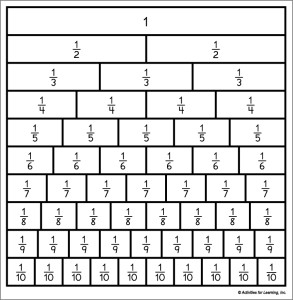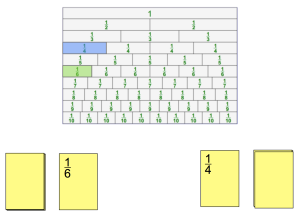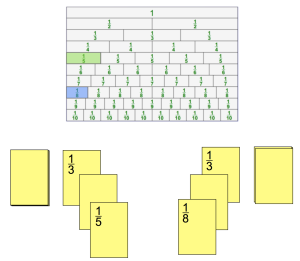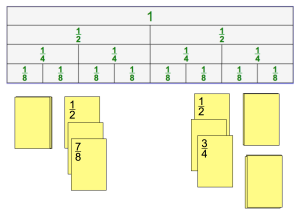Did you all enjoy the Slide-A-Thon game? I thought this was a fun challenge, never mind the learning of my multiples….
This week we’re going to jump into the deep end of the pool with Fraction War games. Now, before any of you run for the hills, let’s look at the best way to learn all about fractions.
Those of you who are frustrated and confused by fractions probably don’t understand what fractions are and how they relate to other fractions, never mind how they relate to “basic” numbers. And if you are uncertain what a fraction is, the environment for understanding is challenging.
Some will say “Oh, I just memorized it.” The problem with sheer memorization is that memorization without understanding is a dandy recipe for disliking something. Add in drill (which of course is needed for memorization) and it’s a sure fire-way to turn children away from an interesting and important topic in math.
Did you know the Asians have the approach with learning that anyone can learn? Doesn’t matter if it’s playing the violin, riding a unicycle, or learning fractions. It’s just a matter of good teaching and some work.
So, this week, let’s play some foundational fraction games. This will ensure your children are approaching fractions with understanding. This will also provide reinforcement for the older children to make sure they have a firm foundation with their fractions. If you want to spend more time with fractions and fraction games, check out the RightStart™ Fractions kit.
Let’s start with the basics. Fractions need to be presented in a linear model, including all the fractions from 1/2 to 1/10.
Notice how the 1/7s and 1/9s are included. Without them, the fraction pattern is skewed. Although we don’t use them often, they are still part of the pattern, therefore must be included.
You can download a fraction chart to use for these games. Keep one chart intact and cut a second chart apart so the pieces can be moved around. A sturdy plastic chart is also available.
Have the fraction chart or fractions pieces in front of the children as they play the following war games. Remember those war card games? My sister and I would spend hours and hours of our summers playing these!
The most simple game is Unit Fraction War, game F2.1 in the Math Card Games book. Kindergarteners can play this game with the fraction chart at hand. We’re just going to use the unit fractions.
If it’s been a long time since you’ve thought about fractions, you’re likely scratching your head, thinking “What’s a unit fraction again?” A unit fraction has 1 in the numerator; 1/2, 1/3, 1/4, 1/5, 1/6, 1/7, 1/8, 1/9, and 1/10. Of course, the list goes on to infinity!
If you’re using our Fraction Card Deck, use all the unit fraction cards. For those of you making your own cards, you’ll need eight 1/2 cards, five each of 1/3, 1/4, 1/5, and 1/6 cards, and four each of 1/8 and 1/10 cards. There are no 1/7 or 1/9 cards because, like we discussed, they aren’t used much and the difference between 1/7, 1/8, 1/9, and 1/10 is minimal when looking at the fraction chart.
Divide the deck of cards evenly between two players or two teams of players. To play, each player takes the top card from his stack of cards and lays it down face up in the middle of the playing area. The player whose card is greater takes both cards and puts them at the bottom of their stack of cards. Have the children take turns deciding whose card is greater so that both practice their skills.
Keep playing until two same cards are played. Now you have a war! When this happens, both children lay one card face down, then lays a third card face up. Now who has the greater amount? That person wins all six cards.
Play until one person or team gathers all the cards from the other player or team. If this dramatic loss is upsetting, play for a specific amount of time, say 10 or 15 minutes. This generally avoids one person being totally cleaned out of cards.
Looking for a slightly more advanced game? Let’s play Fraction War, game F7 in the Math Card Games book. This time we’re going to use the ones, halves, fourths, and eighths. Here it might be useful to use the fraction chart pieces to make a “short” fraction chart as shown below.
Cards needed for this game are as follows: eight 1/2s, five 1s and 1/4s, four 1/8s, and 3 each 3/4s, 3/8s, 5/8s, and 7/8s. If you’re using the RightStart™ Fraction Card Deck, just pull these 34 cards from the deck.
Play the game the same as the Unit Fraction War game. Remind the children to use their fraction charts to help determine the winners of each hand.
When my son was learning fractions, we played this game. I will confess one day to not paying full attention and was just going through the motions when he announced “Mama! I beat you by 1/8!”
Well, that spun my head around. He had played 7/8 and I had played 3/4. Sure enough, he had beat me by 1/8! Although fraction subtraction wasn’t the point here, he figured it out, thanks to the fraction chart.
When the children are comfortable with this game and ready to advance again, play Harder Fraction War, game F9 in the Math Card Games book. This time, use all 74 of the fraction cards so that different denominations are being compared. Again, use the Fraction Chart as this builds a visual model of the fractions and their relationship with each other.
Here’s a peek at the Reid kids enjoying a game….
Have a great day and go play a math card game! Leave us a note below and tell us how much fun your kids are having.







This has been such a huge hit with my daughter. I am amazed at how well RS has taught her the beginnings of fractions so far!
This game has really forced her to see how fractions can compare to each other. That’s something that even some high school students struggle with.
Thanks or such a fun game.